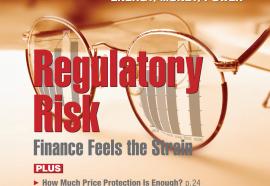Tilting to Windward
As if carbon control were a fait accompli, gen developers skew the queue toward renewable projects, driving new policy on transmission pricing.
Now at last, in a region other than California, we can see clearly that renewable mandates and fears of carbon taxes have influenced the power-plant development cycle. Moreover, this effect is helping to drive policy proposals for the pricing of transmission service and the recovery of costs for grid upgrades deemed necessary to bring the new plants on line.











